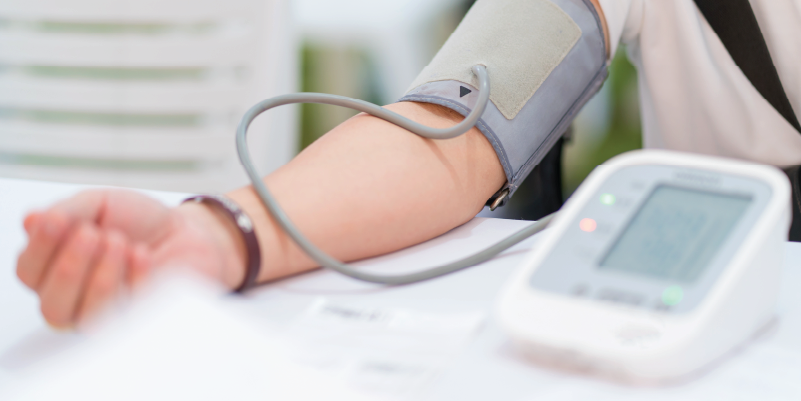Have you ever experienced ringing in your ears when the environment around you is quiet? It’s possible that it could be a symptom of having high blood pressure, known as tinnitus. Having high blood pressure is a relatively common condition, with the CDC reporting that 1 in 3 adults in the United States experience hypertension. Tinnitus affects around 50 million Americans, with noises ranging from mild to intolerable, with each individual’s experience being unique.
In this blog, we will explore the connection that exists between high blood pressure and our hearing and also answer the question, “Can high blood pressure cause ringing in our ears?”
How are Blood Pressure and Tinnitus Connected?
More research shows links between high blood pressure and hearing loss due to how our blood moves around our bodies and the fragile nature of our hearing system. There are a lot of delicate veins and hairs around our ears, so any abnormal activity can disrupt or damage our ability to hear.
Hypertension increases the blood flow force through our veins, making our blood thicker. This causes audible pulsing sounds in the vessels near our ears since the vein system surrounding our ears is more narrow. It can be difficult for thicker blood to flow through our blood vessels, causing a lack of oxygen and weakening the vessels, which then leads to hearing loss. This is why most medications for high blood pressure are blood thinners, making blood flow through our vessels more smooth and preventing damage.

What is Tinnitus?
If you’ve been experiencing a persistent ringing or buzzing sound in your ears, you’ve been experiencing tinnitus. There’s no set list of symptoms that signal tinnitus because everyone’s experiences can vary, so most cases of tinnitus are subjective. The causes of tinnitus are also unclear, but most people who experience tinnitus symptoms have some level of hearing loss which has been linked to one of the following:
Noise Exposure
Exposure to loud noises in the workplace or at social events (sports, concerts) can lead to tinnitus and hearing loss.
High Blood Pressure
Health problems relating to our blood vessels, like high blood pressure, can affect how the blood flows through the delicate blood vessels near our ears and cause tinnitus. Hypertension thickens our blood to a point where our vessels may struggle with blood flow and cause irreversible damage.
Infections
Any fluid from an ear infection or earwax buildup can trigger symptoms of tinnitus and affect the way we hear sound in the ear.
Head & Neck Injuries
Injuries in the head & neck can cause damage to our inner ear structures and in the areas of our brain that process sound, which can cause tinnitus.
Medications
Tinnitus has been linked to some medications as a lasting side effect. This comes from anti-inflammatory drugs, some antibiotics, antidepressants, anti-cancer drugs, and some anti-malaria medications.
How to Treat Tinnitus Caused by Hypertension
Firstly, we’d recommend talking to your healthcare provider about your experiences and concerns regarding tinnitus and high blood pressure for a more personalized treatment plan than we can provide in this blog.
Lifestyle changes are required to help manage high blood pressure and address your tinnitus symptoms long-term. Hypertension has the potential to become a serious health issue beyond tinnitus, and effectively managing it can boost your physical and mental well-being. Some lifestyle changes you should consider adopting include:
- Regular exercise (2-3 times a week for 30 minutes)
- Adding more fruits and vegetables to your diet
- Drinking more water
- Reducing sodium consumption
If your physician finds it necessary, they can prescribe medication (usually blood thinners) to help you manage your high blood pressure, and at this point, you should experience less ringing and buzzing in your ears. If your hypertension is being managed and monitored and you’re still experiencing tinnitus, please consult your doctor for additional help and testing.

When to Seek Emergency Help
To learn more about high blood pressure (unrelated to tinnitus), please refer to our page all about high blood pressure. However, if you’ve been diagnosed with tinnitus as a result of high blood pressure and you experience any of the following symptoms, please seek emergency care immediately:
- Severe headaches
- Seizures
- Vomiting
- Chest pains
- Shortness of breath
- Fast/fluttering/pounding heartbeat
24/7 Emergency Center
In conclusion, if you have been experiencing ringing or other sounds in your ears, it could be tinnitus due to high blood pressure. Research has shown that there are links between the two conditions, but there’s no direct cure for either as well.
To manage hypertension and symptoms of tinnitus, lifestyle changes or a change in medication may be necessary. Your physician can help determine a treatment plan and how to successfully navigate your symptoms. However, if you experience any worrisome symptoms before you can visit your healthcare professional, please visit your closest emergency center.
At Neighbors Emergency Center, we’re always here to provide exceptional care to anyone who visits one of our 8 locations. Visit our website to find our closest location near you.

